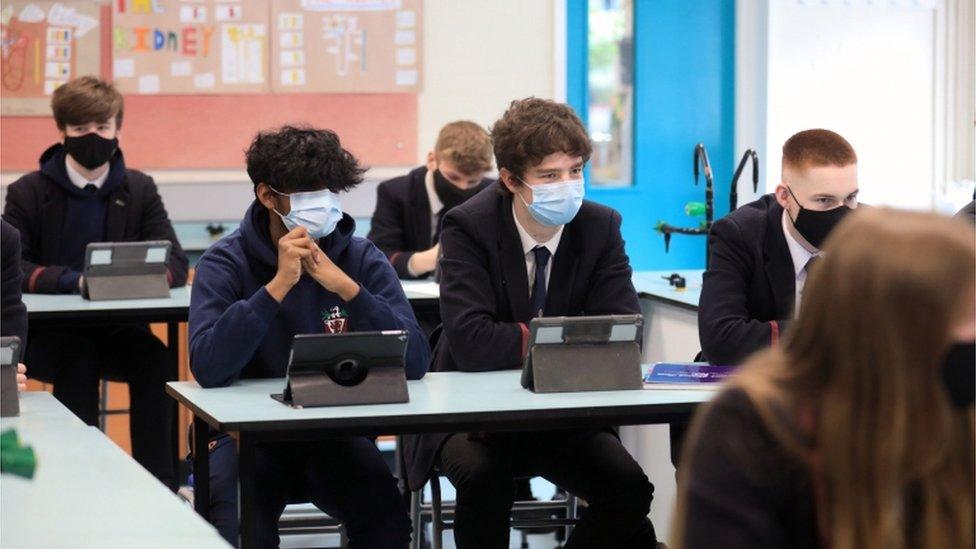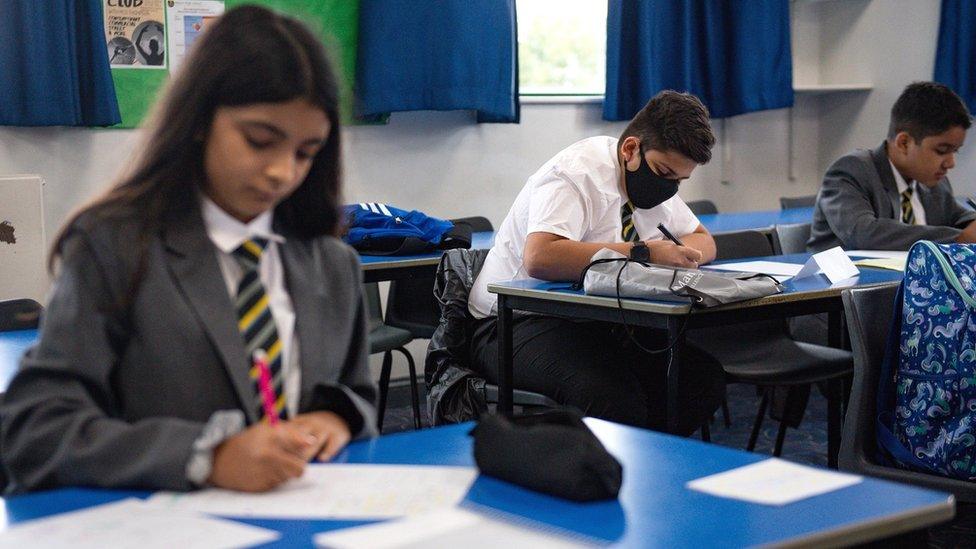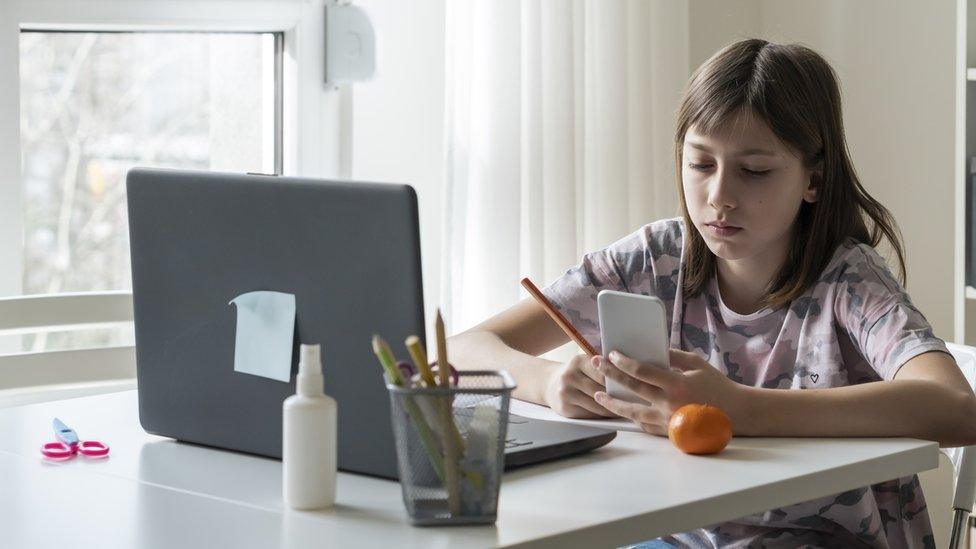Covid-19: Pupils will not have to 'routinely self-isolate'
- Published
- comments

The Public Health Agency takes over school contact tracing on Friday
Pupils in the same class as a positive Covid case "will not routinely be asked to isolate and book a test", ministers have said.
Health Minister Robin Swann and Education Minister Michelle McIlveen said the Public Health Agency (PHA) would take a "more targeted approach" to contract tracing.
The agency will begin tracing close contacts in schools on Friday.
The move brings Northern Ireland into line with England, Scotland and Wales.
Teaching unions had called for the move to ease the burden placed on principals and school leaders to trace close contacts.
Some schools have had hundreds of children already miss time in class.
Disruption 'not tenable'
Self-isolation guidance for schools is aimed at pupils spending less time out of school if they are identified as close contacts.
Mr Swann and Ms McIlveen said that the disruption schools and pupils had faced was "not tenable".
"The high community prevalence of Covid-19 in Northern Ireland has led to a large number of cases being reported by schools and an extremely large number of children being identified as close contacts and asked to isolate and book a PCR test," they said.
"This has resulted in major disruption to children's education."
The ministers said that the PHA would identify and ask "the very closest contacts - for example very close friends - to isolate and get a test".
They added: "Other contacts in school - such as those in the same class or who sit near the case - will not routinely be asked to isolate and book a test."
Schools have been given interim advice, which will be followed by detailed guidance in the coming days.
Close contact definition may have to change: PHA
Parents and guardians will be "primarily responsible" for informing schools their child has tested positive for Covid-19, the PHA said.
Dr Elizabeth Mitchell, the PHA's contact tracing director, said the new arrangement may also require the definition of close contact for pupils to change.
She said the approach would allow more children to stay in school, adding "there is a balance to be struck in terms of risk".

The move will take the contact tracing burden off school leaders
"Time is needed to fully embed this service but from today the PHA contact tracers will speak to parents or guardians of positive cases and ask for their support in identifying their child's close contacts.
"Parents and guardians will be primarily responsible for informing the school principal of their child's positive result.
"School leaders will no longer be required to respond to every case and identify contacts. The PHA will undertake the work and will contact the school principal for assistance in certain circumstances."
The PHA said that if a child tests positive, parents should expect to receive a call from the Contact Tracing Service on 028 95368888.
A separate arrangement will be made for special schools.
Low risk
Studies have shown that the overall risk of children becoming severely ill or dying from Covid is extremely low.
Mr Swann and Ms McIlveen also said that there was evidence that the "vast majority of those identified as school close contacts and sent home to isolate during the 2020/21 school year did not go on to develop Covid-19".
"The English daily contact testing study published during the summer was carried out in post primary schools during the summer term in 2021 when Delta was becoming dominant," their memo said.
"It found that across all the schools taking part, only 1.6% of those identified as close contacts went on to become confirmed cases within 14 days."
The ministers also cited a study from Public Health Scotland on the 2020/21 school year which found that only 7.9% of close contacts in primary school and 2.3% of close contacts in post primary schools went on to become cases.
"Data on close contacts collected by the PHA during spring term 2021 shows similar patterns," the ministers wrote.
"Analysis of over 18,500 school close contacts who were asked to isolate showed that the vast majority did not go on to become cases.
"PHA analysis of these 18,500 close contacts showed that children from the most disadvantaged areas were more than twice as likely to have to isolate compared to children from the most affluent areas further exacerbating inequalities."
'No longer justified'
Dr Joanne McClean from the PHA said Covid-19 was now posing a greater risk to children's education than to their health.
"Covid is a mild illness for the vast majority of children," she told the BBC's Good Morning Ulster programme.
"Children are not, by and large, being harmed by Covid. Children are being harmed by missing school."

Hundreds of pupils have spent their first few days of the new term distance learning in self-isolation at home
Dr McClean said schools had been "majorly disrupted" over the past two years and at this point, there was a need to balance the impact on children's education with the need to control Covid-19 infection rates.
"We reached the stage in the pandemic now with the vaccination programme having reached 90% of the adult population, and other restrictions being lifted, that we can no longer justify an approach where really we're harming children by sending them home from school.
"So we need to move away from that and go for [contact trace] the children who are most likely to test positive," she added.
In a separate statement, Ms McIlveen said that "only in certain circumstances" would a school be asked to assist the PHA in contact tracing.